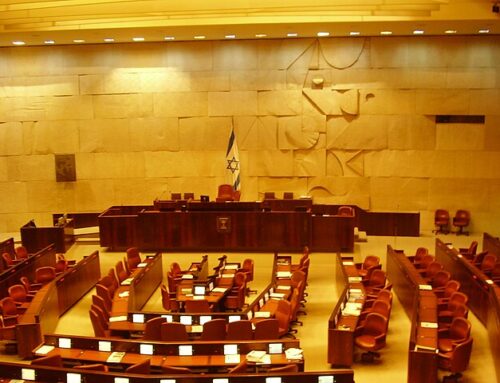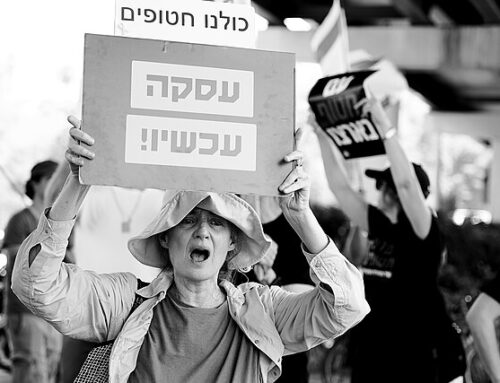Dore Gold (pictured above), the new director-general of Israel’s foreign affairs ministry, and Gen. Amos Yadlin, a retired head of IDF intelligence who currently heads a centrist think tank in Israel, addressed a packed hall at New York’s UJA-Federation headquarters, under the auspices of the Conference of Presidents of Major American Jewish Organizations. Dr. Gold is an American Israeli who has long been a pro-Likud official and think-tank analyst. His most prominent job in the past was as Israel’s ambassador to the UN. Major General Yadlin is regarded as centrist, but both share the conviction that the P5 +1 nuclear deal with Iran is flawed.
Yet while Gold would like to see it rejected by Congress, Yadlin sees that “No deal now is more dangerous than no deal a year ago.” Neither see it likely that the deal will moderate Iran’s aggressive behavior in the region, as most backers of the deal hope it will. Yadlin doesn’t entirely rule this out, but he gives it very low odds — something like “five percent” (because of his somewhat incomplete command of English, it was hard at times to know precisely what he was saying).
Short-term, Yadlin says, the agreement is “A-/B+,” as it provides for better inspection measures and much reduced enriched uranium stockpiles than exist now. Long-term, however, he characterizes it as “a disaster,” because when it sunsets in 15 years, Iran could be closer to a bomb — although it would still be legally obliged not to go there, as a signatory to the Nuclear Non-Proliferation Treaty.
Gold spoke about Foreign Minister Zarif becoming a popular presence in the US, as a soft-spoken representative of the Iranian regime who is very fluent in English. But Gold observed that in January, 2014 (noting that this was a recent date, not 10 or 15 years ago), in a visit to Lebanon, he laid a wreath at the grave of an important Hezbollah leader (whose name I did not catch), who was instrumental, according to Gold, in devising that group’s terrorist tactics in the 1980s.
A large annotated map in front of the room where we met, depicted the alleged extent of Iran’s aggressive activities in the Middle East. Aside from arms and other assistance to Hezbollah, Hamas, Assad and Shiite militias in Iraq, there were the Houthi militia in Yemen, the Taliban in Afghanistan and some others in Bahrain. I can’t say if these latter examples are real; I know that the Houthis deny a relationship with Iran (or vice versa), but I don’t know the truth here. An Iranian relationship with the Sunni Taliban would surprise me, but I can’t rule it out.
Regardless, we know that Iran’s tentacles are extensive, and generally not constructive — to say the least. To my mind, the fact that Iran’s aggressive foreign policy was excluded from the negotiations may be a major shortcoming, or it may have been unavoidable. The sunset provision may also be a grievous weakness, or it may have been unavoidable.
There was some discussion of the 24-day delay involved in inspecting newly suspected nuclear sites that were not previously under inspection. Yadlin said that the Iranians cannot coverup nuclear traces, but that evidence of weaponization can be concealed.
Yadlin is more inclined to think that Iran would want to maintain its potential as a nuclear threshold state rather than to necessarily decide upon actually building bombs. It apparently has succeeded in doing so with this agreement.
Generally speaking, I share the view of most liberals that we are better off having delayed a possible nuclear-armed Iran by 15 or more years than not, especially if this is a springboard for Iran to moderate its international relations in the interest of improving the material lives of its people. But there are no guarantees. And I am a little less hopeful on the eventual outcome than I was before attending today’s event (July 29).
Still, the Conference of Presidents has not entertained a wide range of opinions in its deliberations on Iran. At this meeting, for example, there were only two views represented, and they were not very far apart. Only Gideon Aronoff, the CEO of Ameinu, had the khutspah to declare his group’s support for the deal (during the Q & A), including the sensible caveat that Iran’s non-nuclear threats in the Middle East need also to be dealt with by the world.
We understand from recent polls sponsored by the LA Jewish Journal and a separate study commissioned by J Street, that more American Jews support than oppose the deal. Yet this fact is not reflected in the organized Jewish community.
And there was very little response to a question about what the implications would be if American Jewish organizations and Israel are seen as critical in derailing this agreement. Dr. Gold responded obliquely that in the end the US and Israel are allies, and there is precedent for allies to disagree. He cited the 1980s arguments within NATO about the placement of missile systems in Europe. But I recall no effort at that time of NATO members openly lobbying Congress to work against the policies of the US administration.
This new article in Foreign Policy magazine, for example, raises this concern:
Opinion: Israel Could Lose America’s Democrats for a Generation, “If the nuclear deal collapses, U.S. liberals will never forgive Israel for its starring role in a catastrophic turn of events,” writes James Traub.
Jane Eisner raises this concern even more starkly in her editorial in The Forward:
. . . what if Israel and its American supporters are able to accumulate enough votes to override a promised presidential veto? What then?
The president will be crippled, and the United States isolated on the world stage. It’s unlikely that Iran will return to negotiations, and highly likely that Russians and Chinese will begin trading with Tehran. And if a military option turns out to be the only way to stop an unregulated Iran, you can rest assured that Israel and, by extension, America’s Jews will be held responsible for igniting the next Middle East war. . . .
But before you take a tranquilizer, I recommend this sage exploration of the uncertainties and complexities of the Iran agreement by Aaron David Miller, a former State Department Middle East hand of repute, in the current issue of The Jewish Week:
The ‘Truth’ About The Iran Deal: “A former U.S. Mideast negotiator throws some doubt on supporters’ and critics’ certainties about the pact.”
Then take a tranquilizer, or a stiff drink.
Postscript: To sum up: The organized Jewish community is leaning heavily against the deal, even though the latest polls reveal that this is not reflective of American Jewish opinion. The deal itself definitely has some problematic aspects, but for Congress to defeat it presents its own set of issues which are likely to prove more problematic. Not least is that it places American Jews and Israel in a vulnerable political position, where the Democratic party becomes less sympathetic toward Israel and Americans in general less friendly toward American Jews — especially if aggressive lobbying by Israel and its American Jewish supporters are seen as defeating the deal, and this leads to a violent conflict with Iran.
P.S. 2: Click here for this JTA article by Uriel Heilman, on the Conference of Presidents event. To me, Gen. Yadlin came off as slightly more ambiguous about the agreement than indicated in Heilman’s piece, but as I indicated, Yadlin’s limited command of English made him somewhat difficult to follow at times.







I appreciate the reporting here, and analysis.
Thanks Ralph for this report. Very useful. I will circulate it. You have given us an excellent summary of what happened at the meeting and the quotes at the end were most helpful to guage the thinking of editorial writers.
While I am not familiar with your writings , I can see by this article you are in the ‘left/ liberal’ camp. And it shows in your conclusions. You are headed to the For Iran deal camp. I am a child of Orthodox holocaust survivors who lost virtually all of their (my) extended family to the Nazis. And these tragic experiences factor in my being in the Anti Iran deal camp.
But I think it’s important to get as much information as possible in order to make an informed decision so I urge you to read what these writers have written in the Iran deal.
Robert Satloff, director if the Washington Institute and Leon Wieseltier.
I agree with Mr Satloff that the alternative to this deal is not War and I take exception to Obama’s and Jerry’s bullying, their gratuitous tone of panic and/their treatment of the American people as mentally feeble.
In a nutshell: Ralph worries about the far-fetched but not about what is in fact patently worrisome.
The current Iranian regime denies the Holocaust, calls for the destruction of Israel, agitates for “death to America,” has cheated on all its international agreements … well, it would too tedious to go on. None of this seems to faze Ralph, at least not in this piece.
But here is his real worry, insofar as I understand it. If the US Congress were to turn down this deal with Iran by a veto-proof majority, that could harm the Jews. Why ? Well, the anti-Semites would blame the Jews. Yes, blame the Jews for what the Congress has done. Of course the anti-Semites blame the Jews anyway for everything no matter what happens, but never mind.
Beyond this, I must say that Ralph’s relationship to facts is, let us say, different from mine. He cites polls conducted by JStreet to the effect that American Jews support the deal. Maybe that’s true in the polls he has seen. The ones I have seen show the opposite. These latter ones are of course as available to Ralph as they are to me, but he doesn’t cite them.
Ralph, pretty much alone among those who write about the subject, declares himself agnostic on the subject of Houthi-Iranian entanglement. After all, he notes, both the Houthis and Iran (truthful folks, they) deny it. I am no expert. I read neither Arabic nor Persian (does Ralph ?). But the opinion of experts that I have read is well represented by this report in USA Today of April 20, 2015: “”There is a well-documented history of (Iranian) support for the Houthi, including in various State Department reports — money, weapons — support for a very long time,’ State Department spokeswoman Marie Harf told reporters Monday.”
I’m not denying that there’s a relationship between Iran and the Houthis, I just don’t know.
More important regarding Werner’s complaints on this post is that he doesn’t get that I have serious misgivings about the agreement (perhaps I didn’t make this clear enough). I even considered musing that maybe the West would have been better off to leave the sanctions in place and wait for the Iranians to come around on stopping its blatantly hostile foreign policy and to where it clearly gave up the option for nuclear weapons.
But with an agreement in place, I see a rejection by Congress as more problematic than its shortcomings — especially if “the Jews” can be blamed — and a new armed conflict ensues. So yes, I see approving the agreement as a better option for all of us (including Israel) than overturning it. And there is hope (albeit slim, perhaps) that the agreement will trigger a real reform of the regime’s external behavior.
[…] long-term trend. This is not to contradict concerns expressed on this blog by Ed Goldstein and myself earlier, that Netanyahu’s aggressive confrontations with Obama, and the organized Jewish […]